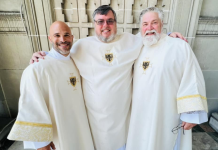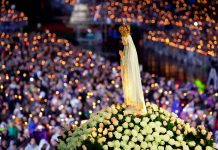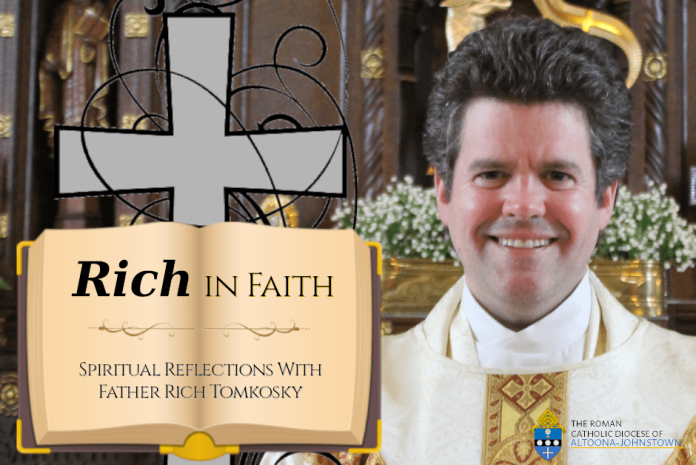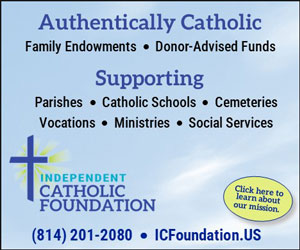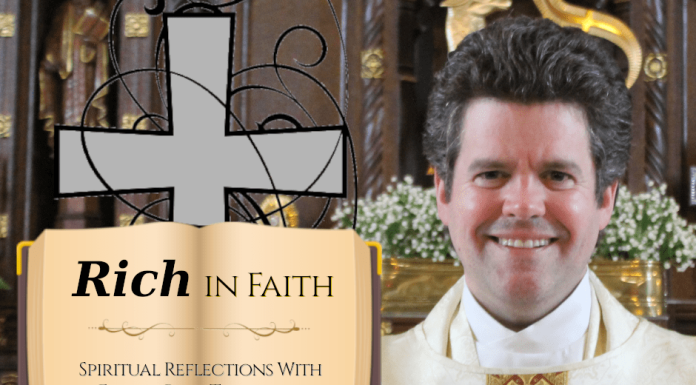By Father Rich Tomkosky
We are now in the “ordinary” time of the Church’s liturgical year until February 22nd when Lent begins this year. So the big question is: how do we grow in holiness during “ordinary” time?
All of us if we are somewhat serious about our faith life work on some spiritual things during Advent and Christmas and Lent and Easter, but what about outside of those high points of the Church’s year? A few things to look at to help in that regard.
Obedience
Obedience to Christ and the authoritative teaching of His Catholic Church, which is made known to us though the Sacred Magisterium – the Pope and the Bishops teaching in union with him. It is not easy in our current culture of self-willfulness and after the clergy scandals. Evangelization is an uphill battle right now, but the Faith is still true.
Obedience means having a listening heart. We are to form our inner moral sense or conscience by the standards of Christ and His Church and not by the standards of the world. Just “following our conscience” is not enough. It needs to be a well-formed conscience based on the teachings of our Faith as revealed by God through the Catholic Church.
Are we trying to do this: to keep God’s Commandments – the 10 Commandments and then the teachings God makes known to us through the Church? To form our consciences properly is why we have catechism classes for our young people, but it should also carry over into adulthood. If we don’t know the content of the Faith, how can we live it well?
Over the next weeks until Lent, take some time to watch some good shows on EWTN or listen to a Catholic podcast. Read a good Catholic spiritual book about Jesus or Mary or the saints, or on doctrine/morality, or on prayer/spiritual life, or the Catechism of the Catholic Church (see the Catechism in a year podcast- the 1# podcast in the US last week – pretty amazing).
Humility
It takes humility to be willing to follow God and the Catholic faith when life comes up against us and when it would be more agreeable to take the “easy” path of compromise and rationalization. So many Christians today are “friends” of the world, but as the saints say, you can’t be a friend of God if you are a friend of the world at the same time.
Of course, “world” in this context of the spiritual life doesn’t mean the beauty of creation that we live in on earth. It means the worldly mentality which is so prevalent today – living life as if God doesn’t exist, or if He does exist, He doesn’t care what we do here on earth morally or spiritually. That is one of the main lies of the Evil One, the devil, who tries to trick all humans into thinking they can be God, the arbiter of good and evil, which is the original temptation that humans gave into as shown in the Garden of Eden story.
In contrast, we are called to be like Saint John the Baptist, who pointed people to Jesus and who said Jesus must increase while I must decrease. We need to acknowledge our weakness and our spiritual blindness, so that Jesus can heal us over time. That takes real humility.
Desire for Holiness
Do we desire in our minds, our hearts, and our wills to be holy as God is holy? This is what Saint Paul reminded us of in the second reading this past Sunday. In the first reading from Isaiah this past Sunday, we were reminded that God called us to be holy from the moment we were conceived in our mother’s womb (sacredness of human life) – to be a light or witness to the nations of God’s holiness. To grow in holiness means to become more like Jesus in our thoughts, words, and actions each day. The 10 commandments and the teachings of the Church on faith and morals are the guardrails in that process as we travel along the path of earthly life. In all honesty, sometimes we don’t feel like being holy, sometimes we are attached to sin and selfishness; but if we allow the Holy Spirit to work over time, He will transform us so that we don’t just follow our feelings, which are fickle, going up and down, but instead to consistently choose the good in our wills, even when our feelings go against our wills. This is where the gift of a disciplined daily prayer life, regular reception of the Sacrament of Confession and the Eucharist, and practicing some daily acts of self-denial become essential.
How serious are we about growing in holiness? Let’s take the next six weeks before Lent and work on the most important project in earthly life: growing in holiness. God bless you.
Father Rich Tomkosky is the Pastor of Saint Thomas the Apostle Parish in Bedford and Pastor of Seven Dolors of the Blessed Virgin Mary Parish in Beans Cove.


